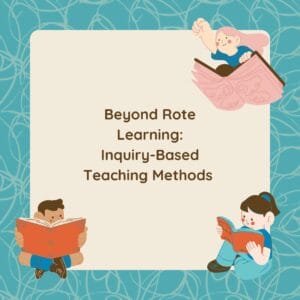In today’s dynamic educational landscape, inquiry-based teaching methods have emerged as a powerful alternative to traditional rote learning practices. By fostering a deeper understanding of concepts through exploration, critical thinking, and problem-solving, these methods empower students to become active participants in their learning journey.
Inquiry-based teaching methods represent a shift from passive absorption of information to an interactive and engaging approach that encourages students to question, investigate, and discover. It aims to create a learning environment where students are motivated by their curiosity, leading to deeper comprehension and retention of knowledge.

Define the Concept of Inquiry-Based Teaching Methods
Inquiry-based teaching methods revolve around posing open-ended questions, encouraging curiosity, and promoting collaborative learning. This approach emphasizes exploring topics through investigation, experimentation, and reflection rather than relying solely on memorization and repetition.
Importance of Moving Beyond Rote Learning
Rote learning, with its emphasis on memorization and regurgitation of facts, often limits students’ ability to think critically and apply their knowledge in real-world scenarios. By adopting inquiry-based teaching methods, educators can nurture a generation of learners who are equipped with essential skills such as problem-solving, creativity, and adaptability.
Preview of What Will Be Covered in the Article
This article delves into the principles, benefits, challenges, and successful implementation of inquiry-based teaching methods. It explores how educators can create engaging and interactive learning experiences that foster curiosity, critical thinking, and collaboration among students.
Understanding Inquiry-Based Teaching Methods
Inquiry-based teaching methods differ significantly from traditional rote learning approaches. Here’s a closer look at what these methods entail and their impact on student learning.
Explanation of What Inquiry-Based Teaching Methods Entail
Inquiry-based teaching methods focus on engaging students in active learning experiences where they investigate questions, problems, or scenarios to deepen their understanding. This approach encourages students to ask questions, seek answers, and construct meaning through exploration and discovery.
Comparison with Traditional Rote Learning Methods
In contrast to rote learning, which relies on memorization and repetition, inquiry-based teaching methods promote critical thinking, problem-solving, and creativity. By encouraging students to explore concepts through inquiry and reflection, educators can enhance students’ learning outcomes and long-term retention of knowledge.
Benefits of Inquiry-Based Teaching for Students
Encourages deeper understanding: Inquiry-based teaching methods promote conceptual understanding by engaging students in exploring topics from multiple perspectives.
Developing critical thinking: By posing open-ended questions and encouraging inquiry, students develop critical thinking skills and analytical reasoning.
Enhances motivation and engagement: Inquiry-based teaching sparks curiosity and interest in learning, leading to increased student engagement and participation in the classroom.
Professional Development for Teachers in Inquiry-Based Teaching
Ongoing training and support are crucial for educators to effectively implement inquiry-based teaching methods.
Workshops, courses, and resources play a vital role in equipping teachers with the necessary skills and knowledge.
Building a community of practice around inquiry-based methods fosters collaboration and shared learning among educators.
Technology Integration in Inquiry-Based Teaching
Utilizing technology in inquiry-based teaching can enhance student engagement and learning outcomes.
Various tools and platforms offer digital resources for research, exploration, and interactive learning experiences.
Best practices involve incorporating technology seamlessly into lessons to complement and enrich the inquiry process.
Collaboration Between Teachers and Education Researchers
Partnering with education researchers can lead to the development and refinement of effective inquiry-based practices.
Sharing insights, data, and experiences creates a knowledge-sharing environment that benefits teaching methods.
Emphasizing continuous improvement in education through collaboration fosters a culture of innovation and growth.
Future Trends and Innovations in Inquiry-Based Teaching
Emerging concepts in education research are shaping the future of teaching methods, influencing the adoption of new approaches.
Technologies such as AI, VR, and other digital tools present opportunities to enhance inquiry-based learning experiences.
Educators must navigate challenges and embrace the potential of innovative trends to advance inquiry-based teaching practices.
Frequently Asked Questions (FAQs)
What are inquiry-based teaching methods, and how do they differ from traditional rote learning?
Inquiry-based teaching methods focus on student-centered learning, encouraging critical thinking, problem-solving, and creativity. They emphasize exploration, experimentation, and group collaboration, unlike traditional rote learning, which relies on memorization and repetition.
How can educators implement inquiry-based teaching in the classroom effectively?
Educators can implement inquiry-based teaching by planning engaging lessons, providing opportunities for hands-on exploration, and facilitating group discussions. By fostering a culture of curiosity and active learning, teachers can create an environment where students actively participate in their learning process.
What are the benefits of adopting inquiry-based teaching methods for students?
Students who engage in inquiry-based learning develop critical thinking skills, creativity, and problem-solving abilities. They also tend to be more engaged, motivated, and independent learners, as inquiry-based methods cater to individual interests and learning styles.
What are some challenges educators may face when transitioning to inquiry-based teaching, and how can they overcome them?
Common challenges include resistance from students, parents, or administrators, as well as a lack of resources or training for teachers. Educators can overcome these challenges by incorporating strategies for effective communication, building a support network, and continuously seeking professional development opportunities.
Conclusion
In conclusion, inquiry-based teaching methods offer a transformative approach to education, moving beyond rote learning to foster critical thinking, creativity, and collaboration among students. By embracing active learning strategies, Socratic questioning techniques, and project-based inquiry, educators can create dynamic and engaging learning environments that prepare students for success in the modern world. It is imperative for educators to explore and adopt inquiry-based methods to meet the demands of a rapidly evolving educational landscape and empower learners to become lifelong critical thinkers and problem solvers.




